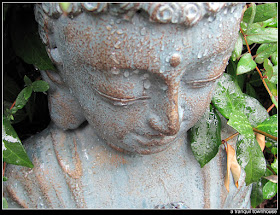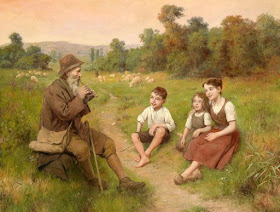—Public Domain Photo
CLOWNS’ HOUSES
—Dame Edith Louisa Sitwell (1887-1964)
BENEATH the flat and paper sky
The sun, a demon's eye,
Glowed through the air, that mask of glass;
All wand'ring sounds that pass
Seemed out of tune, as if the light
Were fiddle-strings pulled tight.
The market-square with spire and bell
Clanged out the hour in Hell;
The busy chatter of the heat
Shrilled like a parakeet;
And shuddering at the noonday light
The dust lay dead and white
As powder on a mummy's face,
Or fawned with simian grace
Round booths with many a hard bright toy
And wooden brittle joy:
The cap and bells of Time the Clown
That, jangling, whistled down
Young cherubs hidden in the guise
Of every bird that flies;
And star-bright masks for youth to wear,
Lest any dream that fare
--Bright pilgrim--past our ken, should see
Hints of Reality.
Upon the sharp-set grass, shrill-green,
Tall trees like rattles lean,
And jangle sharp and dissily;
But when night falls they sign
Till Pierrot moon steals slyly in,
His face more white than sin,
Black-masked, and with cool touch lays bare
Each cherry, plum, and pear.
Then underneath the veiled eyes
Of houses, darkness lies--
Tall houses; like a hopeless prayer
They cleave the sly dumb air.
Blind are those houses, paper-thin
Old shadows hid therein,
With sly and crazy movements creep
Like marionettes, and weep.
Tall windows show Infinity;
And, hard reality,
The candles weep and pry and dance
Like lives mocked at by Chance.
The rooms are vast as Sleep within;
When once I ventured in,
Chill Silence, like a surging sea,
Slowly enveloped me.
________________________
—Medusa
For more about Dame Sitwell, go to en.wikipedia.org/wiki/Edith_Sitwell/.
Photos in this column can be enlarged by
clicking on them once, then clicking on the x
in the top right corner to come back to Medusa.
—Dame Edith Louisa Sitwell (1887-1964)
BENEATH the flat and paper sky
The sun, a demon's eye,
Glowed through the air, that mask of glass;
All wand'ring sounds that pass
Seemed out of tune, as if the light
Were fiddle-strings pulled tight.
The market-square with spire and bell
Clanged out the hour in Hell;
The busy chatter of the heat
Shrilled like a parakeet;
And shuddering at the noonday light
The dust lay dead and white
As powder on a mummy's face,
Or fawned with simian grace
Round booths with many a hard bright toy
And wooden brittle joy:
The cap and bells of Time the Clown
That, jangling, whistled down
Young cherubs hidden in the guise
Of every bird that flies;
And star-bright masks for youth to wear,
Lest any dream that fare
--Bright pilgrim--past our ken, should see
Hints of Reality.
Upon the sharp-set grass, shrill-green,
Tall trees like rattles lean,
And jangle sharp and dissily;
But when night falls they sign
Till Pierrot moon steals slyly in,
His face more white than sin,
Black-masked, and with cool touch lays bare
Each cherry, plum, and pear.
Then underneath the veiled eyes
Of houses, darkness lies--
Tall houses; like a hopeless prayer
They cleave the sly dumb air.
Blind are those houses, paper-thin
Old shadows hid therein,
With sly and crazy movements creep
Like marionettes, and weep.
Tall windows show Infinity;
And, hard reality,
The candles weep and pry and dance
Like lives mocked at by Chance.
The rooms are vast as Sleep within;
When once I ventured in,
Chill Silence, like a surging sea,
Slowly enveloped me.
________________________
—Medusa
For more about Dame Sitwell, go to en.wikipedia.org/wiki/Edith_Sitwell/.
Photos in this column can be enlarged by
clicking on them once, then clicking on the x
in the top right corner to come back to Medusa.





















































